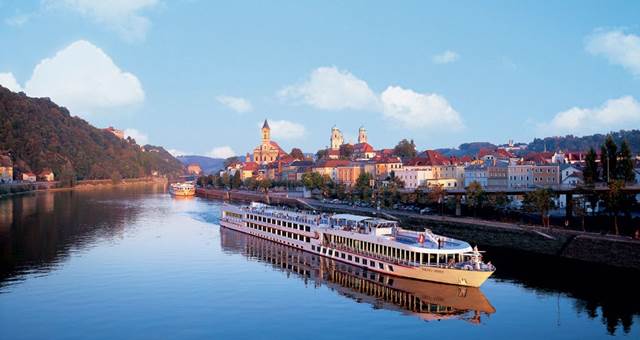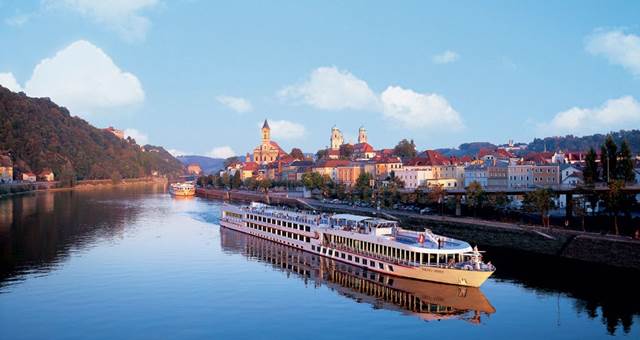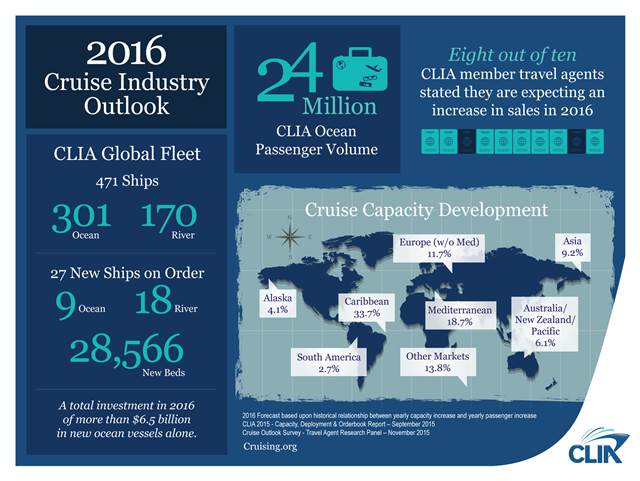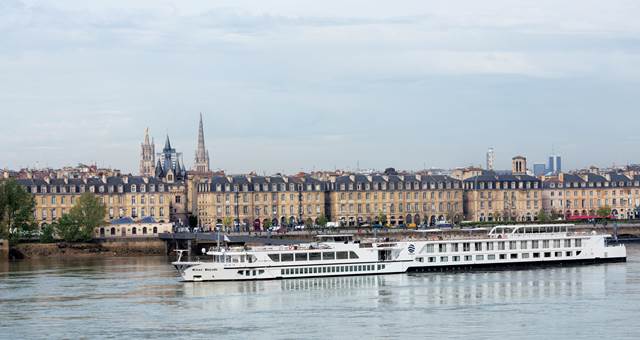

Love it or hate it, it’s not going away. Read on for some key info from the Cruise Lines International Association’s (CLIA) latest report.
The industry shows no signs of slowing down, with nearly 24 million passengers expected to sail in 2016, a dramatic increase from 15 million just 10 years prior (2006) and 1.4 million when CLIA began tracking passengers in 1980. The report highlights Australia’s continued record growth among the notable industry trends, commenting on the six-fold surge in local passenger numbers over the past decade.
The report also reveals member cruise lines are scheduled to debut 27 new ocean, river and specialty ships in 2016 for a total investment of more than $6.5 billion in new ocean vessels alone.
Travel agents are also experiencing a higher demand for cruise travel with eight out of ten US-based CLIA member travel agents stating they are expecting an increase in cruise sales in 2016 over last year.
Read on for the details of the 13 key trends:
Rise of the river cruise – River cruises are growing in popularity, introducing the value and unique travel experience to new cruise travellers. CLIA cruise line members currently deploy 170 river cruise ships with 18 new river cruise ships on order for 2016, an increase of more than 10 per cent.
More ships, more options – In 2015, there are a total of 471 cruise ships with an additional 27 new ocean, river and specialty ships scheduled to debut in 2016.
On the map – Five years ago, cruise travel was almost unheard of in Asia. Today, the region is the fastest growing in the cruise industry. Between 2012 and 2014, passenger volume grew from 775,000 to nearly 1.4 million passengers, a 34 per cent compound annual growth rate.
G’day for a cruise – While Asia continues to grow rapidly, Australia also continues to experience record growth. In fact, Australia’s cruise industry surpassed a major milestone in 2014, exceeding more than one million passengers in a calendar year. In ten years, Australia’s cruise passengers have grown more than six-fold, from a base of 158,000 in 2004.
Cruise specialists – The cruise industry continues to leverage the expertise of cruise specialists to help guide travel decisions. Today, there are more than 30,000 CLIA-member travel agents globally compared to 12,000 travel agents in 2010.
Connectivity and cruising – The cruise industry has made consumers’ desire to stay connected while travelling a priority. Most of today’s cruises offer myriad WiFi, onboard texting and data options.
A love for luxe – The desire for luxury travel continues to rise. Specialty cruise lines are responding with yachting experiences, concierge services, exclusive tours, gourmet dining and personal butler service.
Brands at sea – Cruise lines are leveraging the cross-promotional appeal of brands to appeal to new cruise travelers. From family-friendly household names like LEGO and Dr. Seuss, to upscale luxury brands like Hermes and Veuve Clicquot Champagne, brands are increasingly setting sail on cruise lines.
Ships are the destination – While cruise ships were once considered a mode of transportation to get to a desired destination, today a cruise ship offers the experience of a destination. Latest ships offer unprecedented onboard experiences and amenities for travellers, from Broadway productions and designer shops to zip-lining and bumper cars.
Stay the night – Many cruise lines are offering overnight stays at designated ports of call to give cruisers an opportunity to fully immerse themselves in the experiences available at the destination.
Grand(parent) travel experiences – Intergenerational cruising has become a popular selection for family reunions or the family vacation of a lifetime. With cruise amenities designed to satisfy every age from toddlers to seniors, cruises provide the togetherness (and the independence) that makes intergenerational family travel a success.
Cruise voluntourism – More ‘voluntourism’ cruises are available in 2016 with several ships including excursions to help areas of need around the world. These service-oriented cruises offer a wonderful opportunity to make a meaningful difference in the communities cruise ships visit and a rare experience to embrace and impact local culture.
Culturally customised – Cruise lines are continuing to customise cruise ships based upon passenger cultures. From shopping and dining preferences, vessels are being outfitted to serve guests as well as pay homage to their ports of call.




